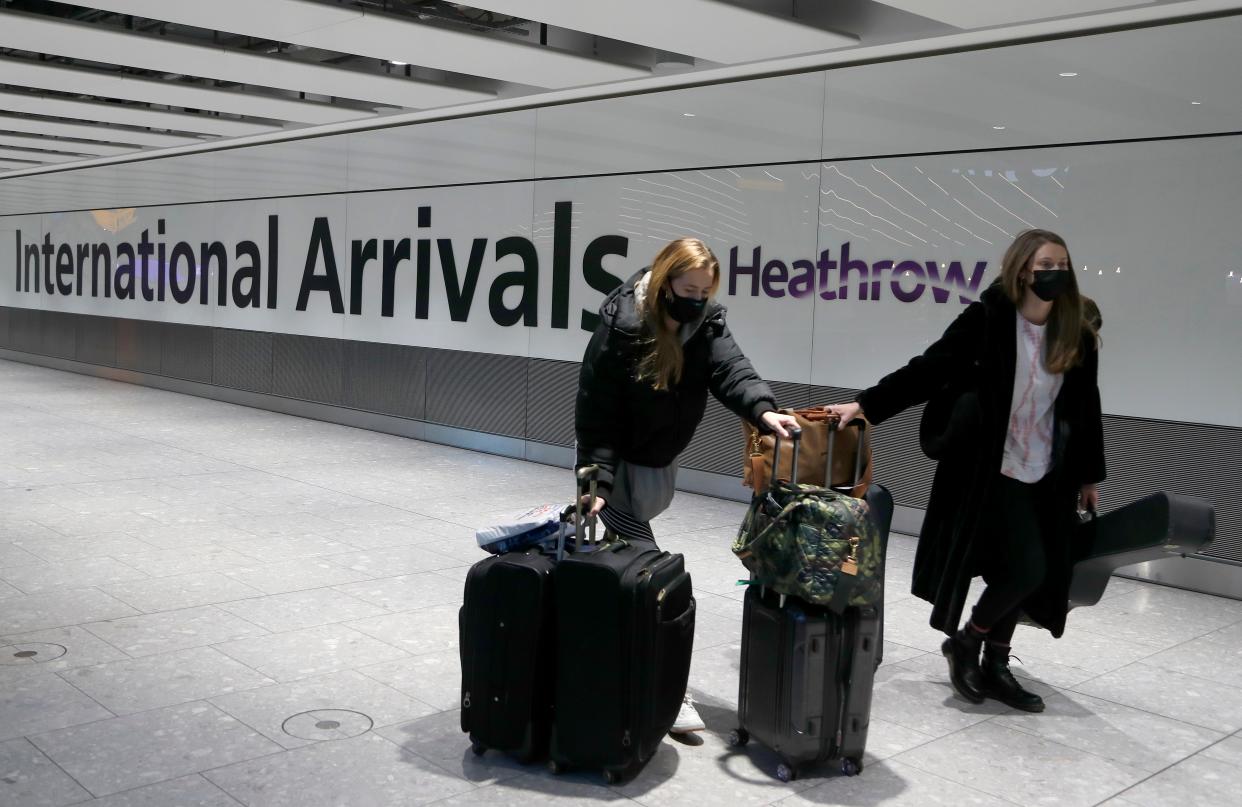Hotel quarantine red list: The 33 high risk countries where new rules apply

Arrivals from certain countries will have to stay at designated quarantine hotels
(AP)Eleven months after the coronavirus pandemic began, the UK government is expected to introduce mandatory hotel quarantine for all arrivals from 33 “high-risk” countries.
The tighter travel restrictions are designed to reduce the introduction and transmission of new variants of the virus.
The strategy of using quarantine hotels or other government-mandated facilities where travellers must self-isolate has already proven successful in other countries including Singapore, Taiwan, Australia and New Zealand.
But which countries are high risk and what are the rules? Here’s everything you need to know.
Watch: Coronavirus - Countries on the UK 'red list'
Which countries are high risk?
The government has announced hotel quarantine plans for Britons returning from high-risk or “red list” countries to stop new coronavirus variants entering the UK.
Prime minister Boris Johnson initially stated the measures would apply to 22 nations, but home secretary Priti Patel later revealed the “red list”, which was comprised of the same 30 countries that currently have a UK travel ban.
This means flights to the UK from these destinations are already suspended and the only arrivals permitted from there are British and Irish nationals or those with UK residence rights.
The countries are mainly located in South America and southern Africa. Here’s the full list:
Angola
Argentina
Bolivia
Botswana
Brazil
Burundi
Cape Verde
Chile
Colombia
Democratic Republic of Congo
Ecuador
Eswatini
French Guiana
Guyana
Lesotho
Malawi
Mauritius
Mozambique
Namibia
Panama
Paraguay
Peru
Portugal (including Madeira and the Azores)
Rwanda
Seychelles
South Africa
Suriname
Tanzania
Uruguay
UAE
Venezuela
Zambia
Zimbabwe
The list was originally 30 countries long. On 28 January, transport secretary Grant Shapps said that an additional three countries had been added to the red list: the United Arab Emirates, Burundi and Rwanda.
However, hotel quarantine for Brits returning from these destinations has not come into effect yet; Shapps tweeted: “This means people who have been in or transited through these countries will be denied entry, except British, Irish and third country nationals with residence rights who must self-isolate for 10 days at HOME.”
Hotel quarantine is expected to be introduced on 15 February, but details about exactly how it will work are still pending.
Watch: COVID-19 - Travellers from 'red list' countries will have to pay £1,750 for 10-day hotel quarantine
What determines whether a country is high risk?
As the move to use quarantine hotels is primarily in response to new variants of Covid-19, it’s likely that a country will be deemed “high risk” if one of the new variants has been identified there. As well as the UK’s own variant, named B.1.1.7, other mutations have been found in South Africa (1.351) and Brazil (P.1). This last “contains a set of additional mutations that may affect its ability to be recognised by antibodies,” according to the US Centers for Disease Control and Prevention (CDC).
It adds: “These variants seem to spread more easily and quickly than other variants, which may lead to more cases of Covid-19. Currently, there is no evidence that these variants cause more severe illness or increased risk of death.”
Will the UK close its borders?
There is mounting pressure from some corners for the government to close UK borders completely, but it is unlikely to happen imminently.
Shadow health secretary Jonathan Ashworth has criticised the government for failing to impose strict measures at the borders sooner.
Speaking on BBC Breakfast, Mr Ashworth said: “We should have had comprehensive border controls in for the past year.
”Priti Patel and Boris Johnson, they tell us they want to take control of their borders, but the one time it actually mattered, and they needed to take control of our borders to protect us, they failed.
“I would urge the government to look at a comprehensive policy, not just the hotspots, because remember, there will be areas or countries across the world where there are mutations which haven't been identified yet because they don't have the same level of scientific ability.”
But prime minister Boris Johnson has reportedly rejected calls by home secretary Priti Patel for a temporary closure of borders to protect the country from the new variants.
Where will high risk travellers stay and how will they get there?
It is likely that hotel rooms will be block-booked – a step that shouldn’t be too difficult considering most accommodation is largely vacant during England’s third lockdown.
For logistical ease, it’s likely the government would opt for hotels near ports and airports so that arrivals don’t have to travel too far. In other countries that have adopted hotel quarantine, travellers are usually transported privately, such as by bus, to lower the risk of transmitting the virus on public transport.
In the Commons, Mr Johnson said returning Britons would be required to “isolate in government provided accommodation, such as hotels, for 10 days without exception”.
“They will be met at the airport and transported directly into quarantine. The Department of Health and Social Care is working to establish these facilities as quickly as possible,” MPs were told.
Travellers will have to finance the quarantine themselves, expected to cost in the region of £1,500.
How long is quarantine?
The current quarantine for all arrivals into the UK is 10 days.
What about all other arrivals?
All travel corridors were suspended on 18 January – which means those entering the country from non-high risk destinations must still self-isolate for 10 days. However, they are permitted to do so at home or while staying with friends or family. Quarantinees are instructed to “travel directly to the place you are staying” but can use public transport to complete their journey.
Watch: How to prevent getting into debt
Read More
‘Hotel quarantine’: What some travellers to the UK will face


